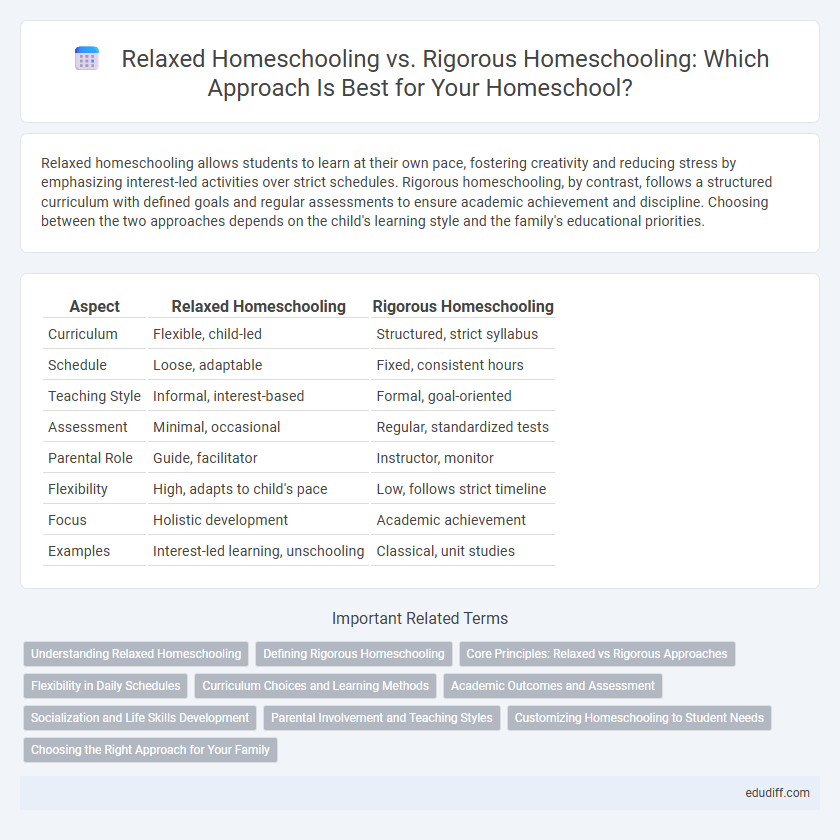Relaxed homeschooling allows students to learn at their own pace, fostering creativity and reducing stress by emphasizing interest-led activities over strict schedules. Rigorous homeschooling, by contrast, follows a structured curriculum with defined goals and regular assessments to ensure academic achievement and discipline. Choosing between the two approaches depends on the child's learning style and the family's educational priorities.
Table of Comparison
| Aspect | Relaxed Homeschooling | Rigorous Homeschooling |
|---|---|---|
| Curriculum | Flexible, child-led | Structured, strict syllabus |
| Schedule | Loose, adaptable | Fixed, consistent hours |
| Teaching Style | Informal, interest-based | Formal, goal-oriented |
| Assessment | Minimal, occasional | Regular, standardized tests |
| Parental Role | Guide, facilitator | Instructor, monitor |
| Flexibility | High, adapts to child's pace | Low, follows strict timeline |
| Focus | Holistic development | Academic achievement |
| Examples | Interest-led learning, unschooling | Classical, unit studies |
Understanding Relaxed Homeschooling
Relaxed homeschooling prioritizes flexibility, allowing children to explore subjects at their own pace and fostering a love for learning without strict schedules or standardized testing. This approach often incorporates real-world experiences and interest-led activities, promoting creativity and critical thinking. Parents adopting relaxed homeschooling emphasize a supportive environment tailored to their child's unique learning style and needs.
Defining Rigorous Homeschooling
Rigorous homeschooling emphasizes a structured curriculum with clear academic goals, frequent assessments, and a disciplined daily schedule to ensure mastery of core subjects. This method often incorporates standardized testing, formal lesson plans, and measurable outcomes to prepare students for higher education or competitive environments. Families choosing rigorous homeschooling prioritize academic excellence, accountability, and comprehensive knowledge acquisition.
Core Principles: Relaxed vs Rigorous Approaches
Relaxed homeschooling emphasizes flexibility, learner-led pacing, and fostering intrinsic motivation, allowing children to explore interests without strict schedules. Rigorous homeschooling focuses on structured curricula, measurable goals, and consistent assessment to ensure mastery of academic standards. Core principles contrast autonomy and creativity in relaxed methods with discipline and accountability in rigorous approaches.
Flexibility in Daily Schedules
Relaxed homeschooling offers unparalleled flexibility in daily schedules, allowing families to tailor learning times to students' natural rhythms and interests, which fosters a more stress-free educational environment. In contrast, rigorous homeschooling typically follows a structured timetable similar to traditional schools, emphasizing consistent hours and subjects to ensure comprehensive coverage of the curriculum. The choice between these approaches directly impacts how families balance academic goals with lifestyle preferences and extracurricular activities.
Curriculum Choices and Learning Methods
Relaxed homeschooling emphasizes flexible curriculum choices, often allowing parents and children to select materials based on interests and pace, fostering creativity and intrinsic motivation. Rigorous homeschooling typically follows structured, comprehensive curricula with scheduled lessons and regular assessments to ensure mastery of academic standards. Learning methods in relaxed homeschooling are often experiential and child-led, whereas rigorous homeschooling utilizes formal instruction and systematic progress tracking.
Academic Outcomes and Assessment
Relaxed homeschooling emphasizes flexible curricula and student-led learning, often resulting in varied academic outcomes that depend heavily on individual motivation and parental involvement. Rigorous homeschooling employs structured lesson plans and frequent assessments, leading to measurable academic progress and standardized testing performance closely aligned with traditional schooling metrics. Assessment in rigorous homeschooling typically includes regular quizzes, exams, and portfolio reviews, whereas relaxed homeschooling relies more on informal evaluations and developmental milestones.
Socialization and Life Skills Development
Relaxed homeschooling fosters socialization through diverse community interactions and flexible schedules, encouraging real-world experiences and adaptability in life skills development. Rigorous homeschooling emphasizes structured curricula and scheduled social activities, promoting discipline and targeted skill acquisition. Both approaches shape social and practical competencies, with relaxed methods favoring experiential learning and rigorous methods focusing on systematic skill mastery.
Parental Involvement and Teaching Styles
Parental involvement in relaxed homeschooling centers on facilitating a child-led learning environment, emphasizing flexibility and emotional support over strict curriculum adherence. In contrast, rigorous homeschooling requires parents to adopt a structured, teacher-like role, implementing detailed lesson plans and regular assessments to ensure academic progress. Teaching styles in relaxed homeschooling are exploratory and adaptive, while rigorous homeschooling prioritizes systematic instruction and measurable outcomes.
Customizing Homeschooling to Student Needs
Relaxed homeschooling emphasizes flexibility and adaptation to a child's learning pace, allowing for a personalized education that nurtures creativity and intrinsic motivation. Rigorous homeschooling, in contrast, follows a structured curriculum with set deadlines and standardized assessments to ensure mastery of core subjects. Customizing homeschooling based on a student's unique needs involves balancing these approaches, tailoring content and pacing to optimize engagement and academic success.
Choosing the Right Approach for Your Family
Choosing the right homeschooling approach depends on your family's educational goals, lifestyle, and child's learning style. Relaxed homeschooling offers flexibility, promoting creativity and reducing stress through self-paced learning, while rigorous homeschooling emphasizes structure, accountability, and mastery of core subjects with detailed lesson plans and assessments. Assessing your child's needs and your capacity to maintain discipline can guide the decision between a more relaxed or rigorous homeschooling method.
Relaxed Homeschooling vs Rigorous Homeschooling Infographic

 edudiff.com
edudiff.com